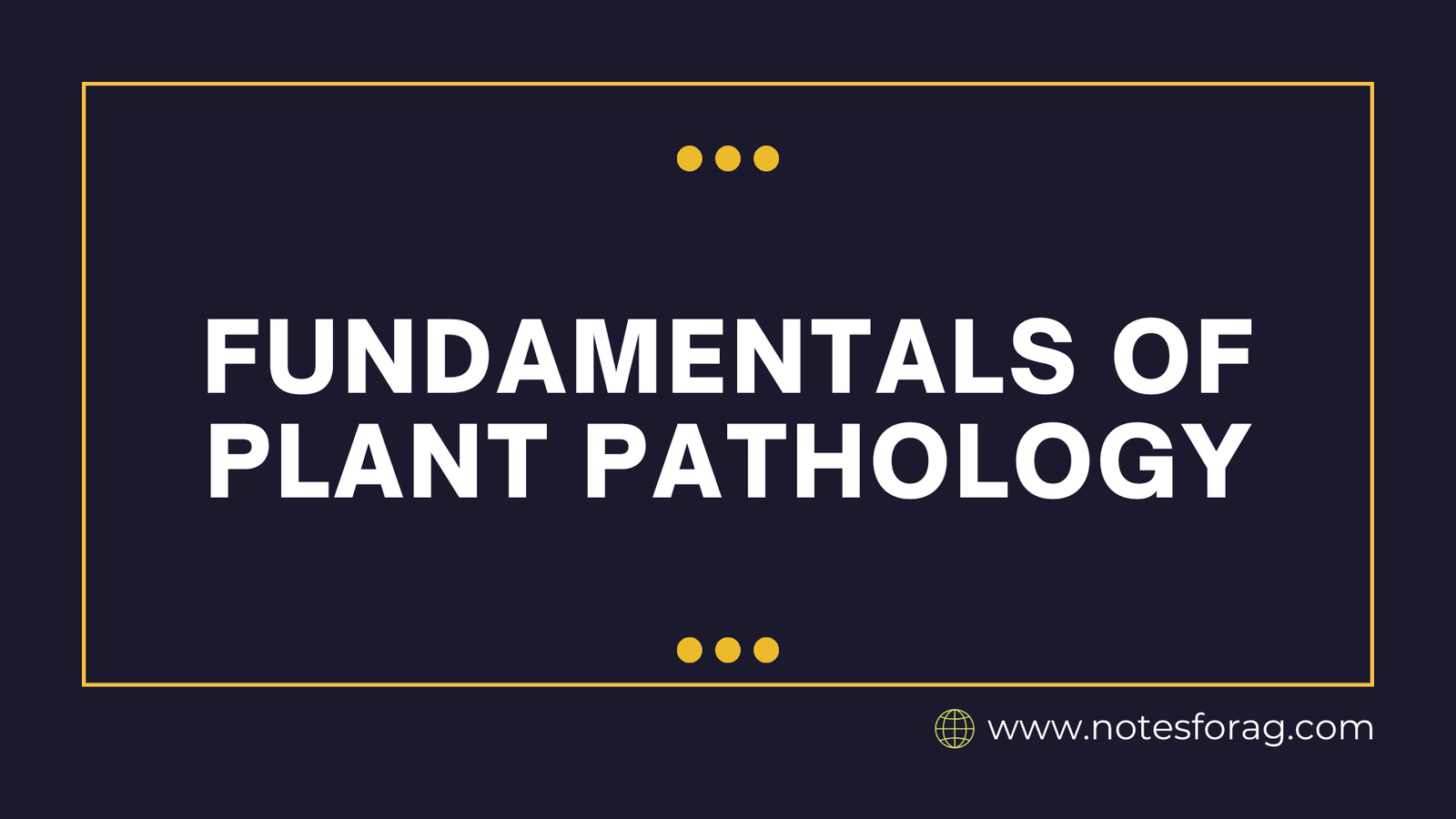Fundamentals of Plant Pathology is the scientific study of plant diseases caused by pathogens and environmental factors. It is crucial in ensuring food security, managing agricultural productivity, and protecting the environment. The field encompasses the identification, biology, and management of plant diseases caused by fungi, bacteria, viruses, nematodes, and other pathogens, along with the interactions between plants, pathogens, and the environment. Understanding plant diseases and their spread is essential for developing effective control measures, improving crop yields, and maintaining ecosystem health. Through Fundamentals of Plant Pathology, scientists and farmers can reduce losses, increase productivity, and ensure sustainable agriculture.
Table of Contents
Objectives of Fundamentals of Plant Pathology
The objectives of Fundamentals of Plant Pathology
- To study the causes, types, and symptoms of plant diseases and the impact of pathogens on crop health and productivity.
- To learn how to identify and classify the various organisms that cause plant diseases, including fungi, bacteria, viruses, and nematodes.
- To understand the mechanisms through which pathogens infect plants and how plants defend themselves against diseases.
- To examine how plant diseases spread and how environmental factors influence the development and severity of plant diseases.
- To study the various methods of controlling plant diseases, including cultural, chemical, biological, and integrated disease management strategies
- To develop skills in diagnosing plant diseases through observation, laboratory techniques, and understanding disease cycles.
- To explore strategies for developing disease-resistant plant varieties through breeding and genetic modification.
- To reduce crop losses by understanding and managing plant diseases, contributing to the sustainability and productivity of agriculture.
Key Topics in Fundamentals of Plant Pathology
Topics covered by Fundamentals of Plant Pathology
- Introduction to Plant Pathology
- Overview of plant diseases and their impact on agriculture and the environment.
- History and development of plant pathology as a science.
- Classification of Plant Diseases
- Categorization of plant diseases based on the causal agents: biotic (fungi, bacteria, viruses, nematodes) and abiotic (nutrient deficiencies, environmental stress).
- Understanding symptoms and disease progression.
- Plant Pathogens
- Study of various plant pathogens: fungi, bacteria, viruses, nematodes, and parasitic plants.
- Their biology, life cycles, and modes of infection.
- Disease Cycle and Epidemiology
- Understanding the stages of a disease cycle: inoculation, infection, colonization, and disease development.
- Factors influencing the spread and development of diseases (e.g., climate, environment, host susceptibility).
- Host-Pathogen Interaction
- The molecular and physiological interactions between plants and pathogens.
- Plant defense mechanisms (e.g., hypersensitive response, systemic acquired resistance).
- Symptoms and Diagnosis
- Identifying common plant disease symptoms: leaf spots, wilting, rusts, blights, and molds.
- Methods of diagnosing plant diseases, including visual inspection, microscopy, and molecular techniques.
- Disease Management and Control
- Integrated Disease Management (IDM) strategies: cultural, biological, chemical, and genetic control.
- Plant resistance, crop rotation, sanitation, and the use of fungicides, bactericides, and antiviral agents.
- Fungal Pathogens
- Detailed study of fungal diseases in plants: rusts, smuts, molds, and blights.
- Life cycles, infection processes, and control methods for fungal pathogens.
- Bacterial and Viral Pathogens
- Study of bacterial diseases (e.g., bacterial wilt, blights) and viral diseases (e.g., mosaic, yellowing).
- Transmission methods, symptoms, and management strategies.
- Nematodes and Parasitic Plants
- The role of nematodes in plant disease (e.g., root-knot nematodes) and the impact of parasitic plants like dodder and mistletoe.
- Management strategies for nematode infestations.
- Environmental Factors in Disease Development
- The role of environmental conditions (temperature, humidity, rainfall) in disease outbreaks.
- How stress factors like drought, nutrient deficiencies, and pollution affect plant susceptibility to diseases.
- Plant Disease Resistance
- The role of genetic resistance in controlling plant diseases.
- Breeding disease-resistant plant varieties and understanding the mechanisms of resistance.
- Emerging Diseases and Biotechnology in Plant Pathology
- Novel pathogens or environmental changes cause new and emerging plant diseases.
- The application of biotechnology (e.g., genetic engineering, CRISPR) in controlling plant diseases.
Importance of Fundamentals of Plant Pathology
Importance of Fundamentals of Plant Pathology
- Helps identify plant diseases and develop methods to control or prevent their spread, reducing crop losses.
- Plays a critical role in safeguarding food production by managing plant diseases that could threaten the global food supply.
- By managing plant diseases, crop productivity is improved, ensuring better harvests and higher economic returns for farmers.
- Disease management not only benefits crops but also protects biodiversity and the health of natural ecosystems.
- Understanding plant diseases allows for the development of disease-resistant crop varieties, improving long-term agricultural productivity.
- Prevents the spread of plant diseases across borders, supporting international trade by ensuring healthy plants and crops are exchanged.
- Effective disease management reduces economic losses caused by plant diseases in agriculture, horticulture, and forestry sectors.
Conclusion
In conclusion, the study of Fundamentals of Plant Pathology aims to understand, manage, and mitigate plant diseases that can otherwise threaten agricultural productivity and global food security. By identifying pathogens and developing effective control strategies, plant pathologists play a critical role in protecting crops, improving yields, and ensuring sustainable farming practices. The importance of this field extends beyond agriculture, as it also safeguards ecosystems, supports global trade, and reduces economic losses. As the challenges of climate change and emerging pathogens continue to grow, plant pathology remains a crucial discipline for advancing agriculture and securing the future of food production.\
Related Articles

